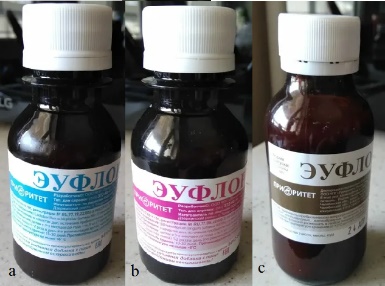
Relevance of application of irradiated starter cultures to production of fermented milk products
Abstract
Keywords
Full Text:
PDFReferences
Shchekina MI. [Healthy food as a way of life. Role and place of probiotic products. Gastroenterology]. Consilium Medicum. 2011;2:61–4. Russian.
Bel’mer SV. Kislomolochnye produkty: ot istorii k sovremennosti [Fermented milk products: from history to the present]. Russian Bulletin of Perinatology and Pediatrics. 2019;6(64):119–25. Russian. doi:10.21508/1027-4065-2019-64-6-119-125
Ardatskaya MD. Metabiotiki kak estestvennoe razvitie probioticheskoy kontseptsii [Metabiotics as a natural development of the probiotic concept]. Trudnyy patsient [Difficult patient]. 2017;6–7(15):35–9. Russian.
Kazakov AV. Velikoe v malom [The Great in the Small]. Yekaterinburg: AMB publishing House; 2010. 150 p. Russian.
Kazakov AV. Sravnenie antimikrobnoy aktivnosti zhidkikh form probioticheskogo i postbioticheskogo produktov [Comparison of antimicrobial activity of liquid forms of probiotic and postbiotic products]. Molochnaya promyshlennost’ [Dairy industry]. 2016;9:56-8. Russian.
Kazakov AV. [Modern liquid starter culture materials based on probiotic bacteria and principles of their production organization]. Yekaterinburg: Ural state economy university publishing house; 2019. 52 p. Russian.
GOST 31450-2013 Moloko pit’evoe. Tekhnicheskie usloviya [Drinking milk. Specifications]. International standard. Moscow: Standartinform; 2019. 10 p. Russian.
GOST 33776-2016 Metody ispytaniy khimicheskoy produktsii, predstavlyayushchey opasnost’ dlya okruzhayushchey sredy [Methods of test for of chemicals of environmental hazard. Determination of pH, acidity and alkalinity]. International standard. Moscow: Standartinform; 2019: 11 p. Russian.
GOST 10444.15-94 Produkty pishchevye. Metody opredeleniya kolichestva mezofil’nykh aerobnykh i fakul’tativno-aerobnykh mikroorganizmov [Food products. Methods for determination of quantity of mesophilic aerobes and facultative anaerobes]. International standard. Moscow: Standartinform; 2010. 7 p. Russian.
GOST 31981-2013 Yogurty. Obshchie tekhnicheskie usloviya [Yogurts. General specifications]. International standard. Moscow: Standartinform; 2014. 18 p. Russian.
Tablitsa perevoda pH i Ternera [pH and Turner translation table] [Internet]. Moscow: Apkimpulse [cited 2020]. Russian. Available from: http://ekomilk.ru/laborotornoe-oborudovanie-news/113
Abbasi H, Mousavi ME, Ehsani MR, Jomea ZE, Vaziri M, Rahimi J, Aziznia S. Influence of starter culture type and incubation temperature on rheology and microstructure of low-fat set yoghurt. International Journal of Dairy Technology. 2009;62(4):549–55.
Cartasev A, Rudic V. The effect of starter culture producing exopolysaccharide on physicochemical properties of yoghurt. Chemistry Journal of Moldova. 2017;12(2):7–12.
DOI: https://doi.org/10.15826/chimtech.2020.7.4.19
Copyright (c) 2020 D. A. Zhuravleva, A. V. Kazakov, I. S. Selezneva, A. A. Baranova

This work is licensed under a Creative Commons Attribution 4.0 International License.
Chimica Techno Acta, 2014–2025
eISSN 2411-1414
Copyright Notice






